Analysis of ASIC v Australian Property Custodian Holdings Limited Case
VerifiedAdded on 2023/06/04
|10
|2541
|370
Report
AI Summary
This report analyzes the case of ASIC v Australian Property Custodian Holdings Limited (No 3) [2013] FCA 1342, focusing on the breaches of director duties under the Corporations Act 2001 (Cth). The report details the background of the case, where directors amended the company's constitution without member approval to impose new fees, leading to personal gain for a director and his family. It examines the specific duties breached, including those outlined in sections 180, 181, 182, 601FC, 601FD, 208, and 601GC of the Act, highlighting failures in care, diligence, good faith, and proper use of position. The decision of the court, which found the directors and the responsible entity liable, is discussed, alongside the case's relevance in emphasizing the importance of director responsibilities and the need for transparency and member approval in corporate decision-making. The report concludes with a reiteration of the significance of director duties and the consequences of non-compliance, emphasizing the protection of company and member interests.

Corporations Law
ASIC v Australian Property Custodian Holdings Limited (No 3) [2013] FCA 1342
ASIC v Australian Property Custodian Holdings Limited (No 3) [2013] FCA 1342
Paraphrase This Document
Need a fresh take? Get an instant paraphrase of this document with our AI Paraphraser
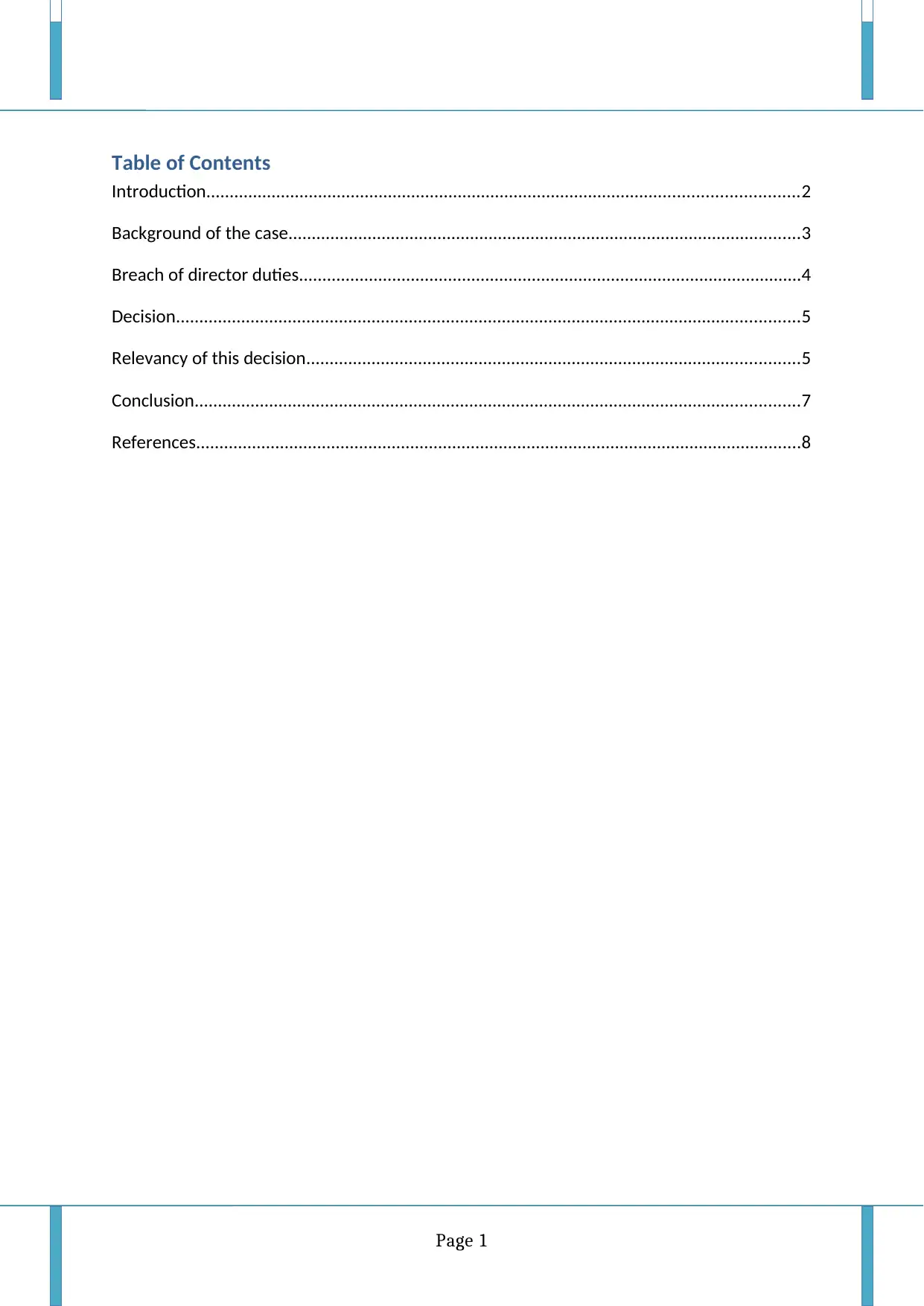
Table of Contents
Introduction...............................................................................................................................2
Background of the case..............................................................................................................3
Breach of director duties............................................................................................................4
Decision......................................................................................................................................5
Relevancy of this decision..........................................................................................................5
Conclusion..................................................................................................................................7
References..................................................................................................................................8
Page 1
Introduction...............................................................................................................................2
Background of the case..............................................................................................................3
Breach of director duties............................................................................................................4
Decision......................................................................................................................................5
Relevancy of this decision..........................................................................................................5
Conclusion..................................................................................................................................7
References..................................................................................................................................8
Page 1
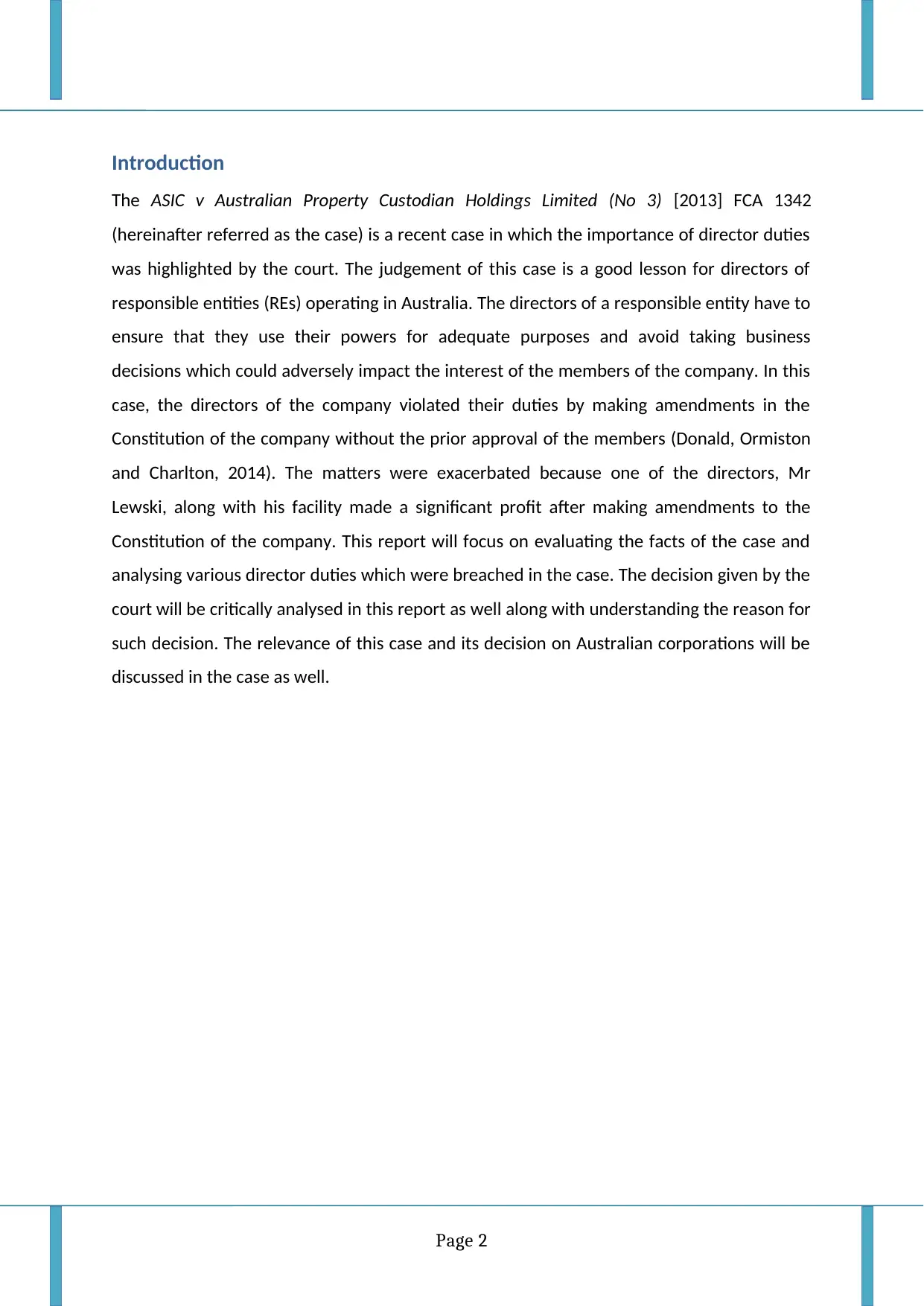
Introduction
The ASIC v Australian Property Custodian Holdings Limited (No 3) [2013] FCA 1342
(hereinafter referred as the case) is a recent case in which the importance of director duties
was highlighted by the court. The judgement of this case is a good lesson for directors of
responsible entities (REs) operating in Australia. The directors of a responsible entity have to
ensure that they use their powers for adequate purposes and avoid taking business
decisions which could adversely impact the interest of the members of the company. In this
case, the directors of the company violated their duties by making amendments in the
Constitution of the company without the prior approval of the members (Donald, Ormiston
and Charlton, 2014). The matters were exacerbated because one of the directors, Mr
Lewski, along with his facility made a significant profit after making amendments to the
Constitution of the company. This report will focus on evaluating the facts of the case and
analysing various director duties which were breached in the case. The decision given by the
court will be critically analysed in this report as well along with understanding the reason for
such decision. The relevance of this case and its decision on Australian corporations will be
discussed in the case as well.
Page 2
The ASIC v Australian Property Custodian Holdings Limited (No 3) [2013] FCA 1342
(hereinafter referred as the case) is a recent case in which the importance of director duties
was highlighted by the court. The judgement of this case is a good lesson for directors of
responsible entities (REs) operating in Australia. The directors of a responsible entity have to
ensure that they use their powers for adequate purposes and avoid taking business
decisions which could adversely impact the interest of the members of the company. In this
case, the directors of the company violated their duties by making amendments in the
Constitution of the company without the prior approval of the members (Donald, Ormiston
and Charlton, 2014). The matters were exacerbated because one of the directors, Mr
Lewski, along with his facility made a significant profit after making amendments to the
Constitution of the company. This report will focus on evaluating the facts of the case and
analysing various director duties which were breached in the case. The decision given by the
court will be critically analysed in this report as well along with understanding the reason for
such decision. The relevance of this case and its decision on Australian corporations will be
discussed in the case as well.
Page 2
⊘ This is a preview!⊘
Do you want full access?
Subscribe today to unlock all pages.

Trusted by 1+ million students worldwide
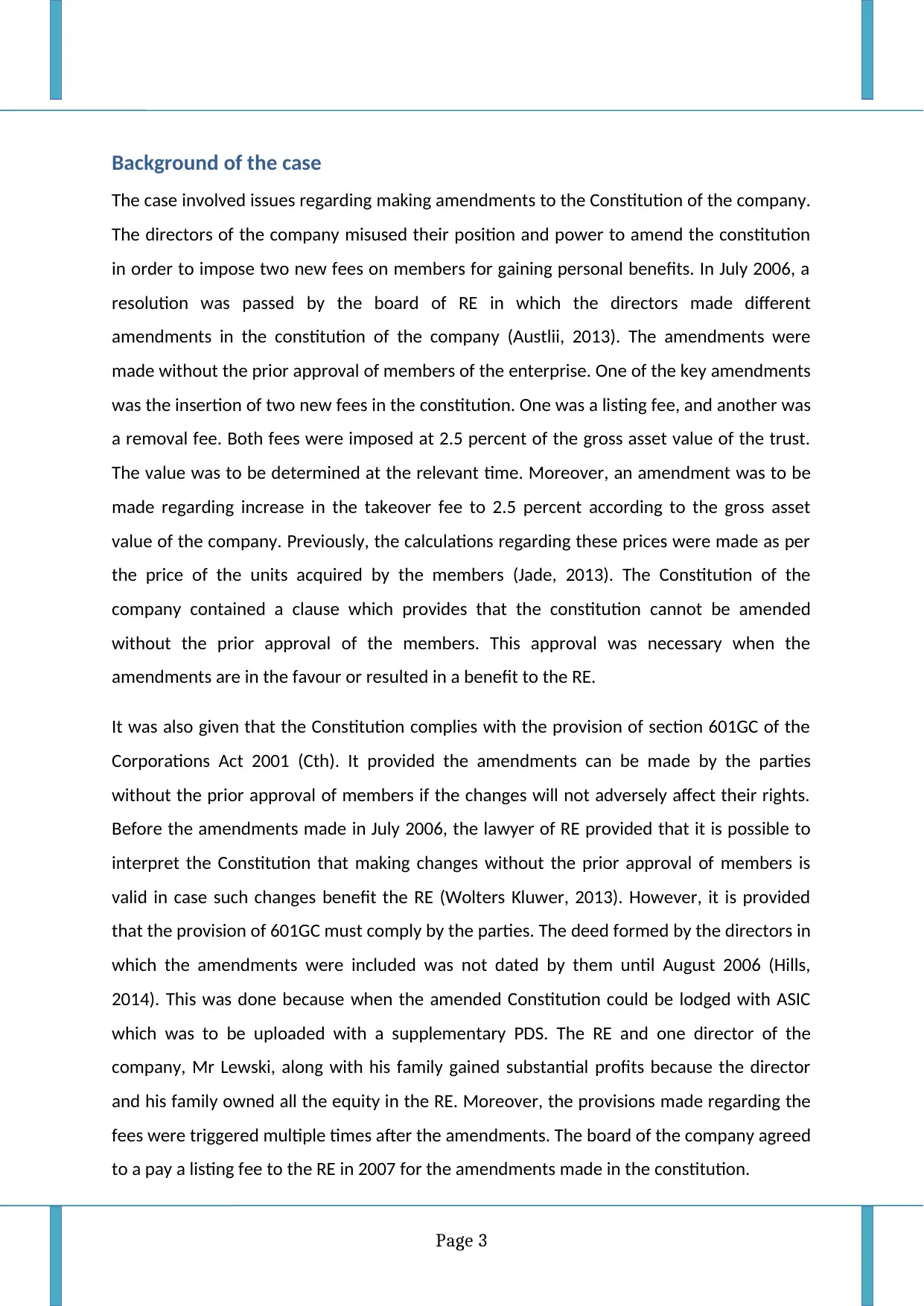
Background of the case
The case involved issues regarding making amendments to the Constitution of the company.
The directors of the company misused their position and power to amend the constitution
in order to impose two new fees on members for gaining personal benefits. In July 2006, a
resolution was passed by the board of RE in which the directors made different
amendments in the constitution of the company (Austlii, 2013). The amendments were
made without the prior approval of members of the enterprise. One of the key amendments
was the insertion of two new fees in the constitution. One was a listing fee, and another was
a removal fee. Both fees were imposed at 2.5 percent of the gross asset value of the trust.
The value was to be determined at the relevant time. Moreover, an amendment was to be
made regarding increase in the takeover fee to 2.5 percent according to the gross asset
value of the company. Previously, the calculations regarding these prices were made as per
the price of the units acquired by the members (Jade, 2013). The Constitution of the
company contained a clause which provides that the constitution cannot be amended
without the prior approval of the members. This approval was necessary when the
amendments are in the favour or resulted in a benefit to the RE.
It was also given that the Constitution complies with the provision of section 601GC of the
Corporations Act 2001 (Cth). It provided the amendments can be made by the parties
without the prior approval of members if the changes will not adversely affect their rights.
Before the amendments made in July 2006, the lawyer of RE provided that it is possible to
interpret the Constitution that making changes without the prior approval of members is
valid in case such changes benefit the RE (Wolters Kluwer, 2013). However, it is provided
that the provision of 601GC must comply by the parties. The deed formed by the directors in
which the amendments were included was not dated by them until August 2006 (Hills,
2014). This was done because when the amended Constitution could be lodged with ASIC
which was to be uploaded with a supplementary PDS. The RE and one director of the
company, Mr Lewski, along with his family gained substantial profits because the director
and his family owned all the equity in the RE. Moreover, the provisions made regarding the
fees were triggered multiple times after the amendments. The board of the company agreed
to a pay a listing fee to the RE in 2007 for the amendments made in the constitution.
Page 3
The case involved issues regarding making amendments to the Constitution of the company.
The directors of the company misused their position and power to amend the constitution
in order to impose two new fees on members for gaining personal benefits. In July 2006, a
resolution was passed by the board of RE in which the directors made different
amendments in the constitution of the company (Austlii, 2013). The amendments were
made without the prior approval of members of the enterprise. One of the key amendments
was the insertion of two new fees in the constitution. One was a listing fee, and another was
a removal fee. Both fees were imposed at 2.5 percent of the gross asset value of the trust.
The value was to be determined at the relevant time. Moreover, an amendment was to be
made regarding increase in the takeover fee to 2.5 percent according to the gross asset
value of the company. Previously, the calculations regarding these prices were made as per
the price of the units acquired by the members (Jade, 2013). The Constitution of the
company contained a clause which provides that the constitution cannot be amended
without the prior approval of the members. This approval was necessary when the
amendments are in the favour or resulted in a benefit to the RE.
It was also given that the Constitution complies with the provision of section 601GC of the
Corporations Act 2001 (Cth). It provided the amendments can be made by the parties
without the prior approval of members if the changes will not adversely affect their rights.
Before the amendments made in July 2006, the lawyer of RE provided that it is possible to
interpret the Constitution that making changes without the prior approval of members is
valid in case such changes benefit the RE (Wolters Kluwer, 2013). However, it is provided
that the provision of 601GC must comply by the parties. The deed formed by the directors in
which the amendments were included was not dated by them until August 2006 (Hills,
2014). This was done because when the amended Constitution could be lodged with ASIC
which was to be uploaded with a supplementary PDS. The RE and one director of the
company, Mr Lewski, along with his family gained substantial profits because the director
and his family owned all the equity in the RE. Moreover, the provisions made regarding the
fees were triggered multiple times after the amendments. The board of the company agreed
to a pay a listing fee to the RE in 2007 for the amendments made in the constitution.
Page 3
Paraphrase This Document
Need a fresh take? Get an instant paraphrase of this document with our AI Paraphraser
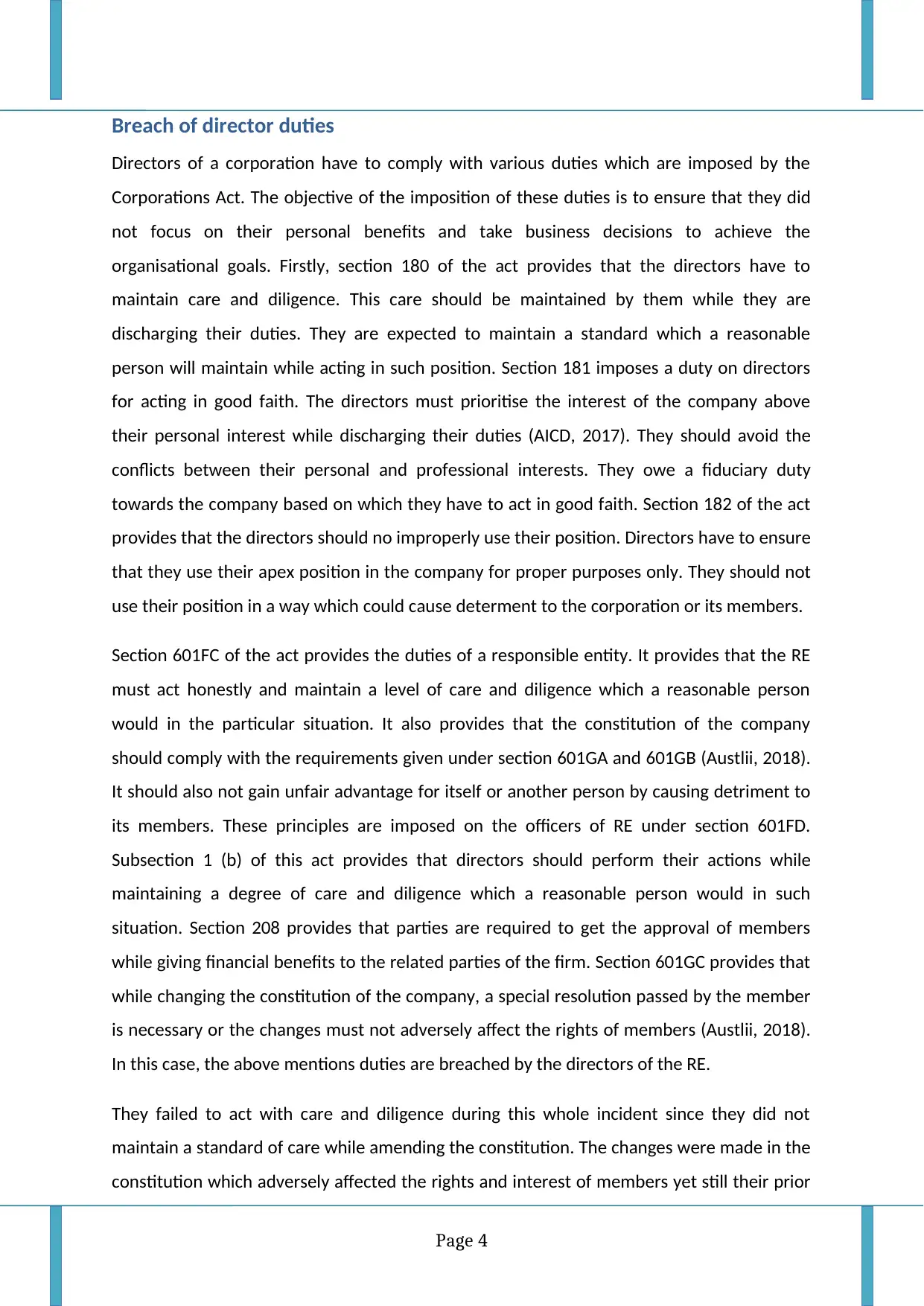
Breach of director duties
Directors of a corporation have to comply with various duties which are imposed by the
Corporations Act. The objective of the imposition of these duties is to ensure that they did
not focus on their personal benefits and take business decisions to achieve the
organisational goals. Firstly, section 180 of the act provides that the directors have to
maintain care and diligence. This care should be maintained by them while they are
discharging their duties. They are expected to maintain a standard which a reasonable
person will maintain while acting in such position. Section 181 imposes a duty on directors
for acting in good faith. The directors must prioritise the interest of the company above
their personal interest while discharging their duties (AICD, 2017). They should avoid the
conflicts between their personal and professional interests. They owe a fiduciary duty
towards the company based on which they have to act in good faith. Section 182 of the act
provides that the directors should no improperly use their position. Directors have to ensure
that they use their apex position in the company for proper purposes only. They should not
use their position in a way which could cause determent to the corporation or its members.
Section 601FC of the act provides the duties of a responsible entity. It provides that the RE
must act honestly and maintain a level of care and diligence which a reasonable person
would in the particular situation. It also provides that the constitution of the company
should comply with the requirements given under section 601GA and 601GB (Austlii, 2018).
It should also not gain unfair advantage for itself or another person by causing detriment to
its members. These principles are imposed on the officers of RE under section 601FD.
Subsection 1 (b) of this act provides that directors should perform their actions while
maintaining a degree of care and diligence which a reasonable person would in such
situation. Section 208 provides that parties are required to get the approval of members
while giving financial benefits to the related parties of the firm. Section 601GC provides that
while changing the constitution of the company, a special resolution passed by the member
is necessary or the changes must not adversely affect the rights of members (Austlii, 2018).
In this case, the above mentions duties are breached by the directors of the RE.
They failed to act with care and diligence during this whole incident since they did not
maintain a standard of care while amending the constitution. The changes were made in the
constitution which adversely affected the rights and interest of members yet still their prior
Page 4
Directors of a corporation have to comply with various duties which are imposed by the
Corporations Act. The objective of the imposition of these duties is to ensure that they did
not focus on their personal benefits and take business decisions to achieve the
organisational goals. Firstly, section 180 of the act provides that the directors have to
maintain care and diligence. This care should be maintained by them while they are
discharging their duties. They are expected to maintain a standard which a reasonable
person will maintain while acting in such position. Section 181 imposes a duty on directors
for acting in good faith. The directors must prioritise the interest of the company above
their personal interest while discharging their duties (AICD, 2017). They should avoid the
conflicts between their personal and professional interests. They owe a fiduciary duty
towards the company based on which they have to act in good faith. Section 182 of the act
provides that the directors should no improperly use their position. Directors have to ensure
that they use their apex position in the company for proper purposes only. They should not
use their position in a way which could cause determent to the corporation or its members.
Section 601FC of the act provides the duties of a responsible entity. It provides that the RE
must act honestly and maintain a level of care and diligence which a reasonable person
would in the particular situation. It also provides that the constitution of the company
should comply with the requirements given under section 601GA and 601GB (Austlii, 2018).
It should also not gain unfair advantage for itself or another person by causing detriment to
its members. These principles are imposed on the officers of RE under section 601FD.
Subsection 1 (b) of this act provides that directors should perform their actions while
maintaining a degree of care and diligence which a reasonable person would in such
situation. Section 208 provides that parties are required to get the approval of members
while giving financial benefits to the related parties of the firm. Section 601GC provides that
while changing the constitution of the company, a special resolution passed by the member
is necessary or the changes must not adversely affect the rights of members (Austlii, 2018).
In this case, the above mentions duties are breached by the directors of the RE.
They failed to act with care and diligence during this whole incident since they did not
maintain a standard of care while amending the constitution. The changes were made in the
constitution which adversely affected the rights and interest of members yet still their prior
Page 4
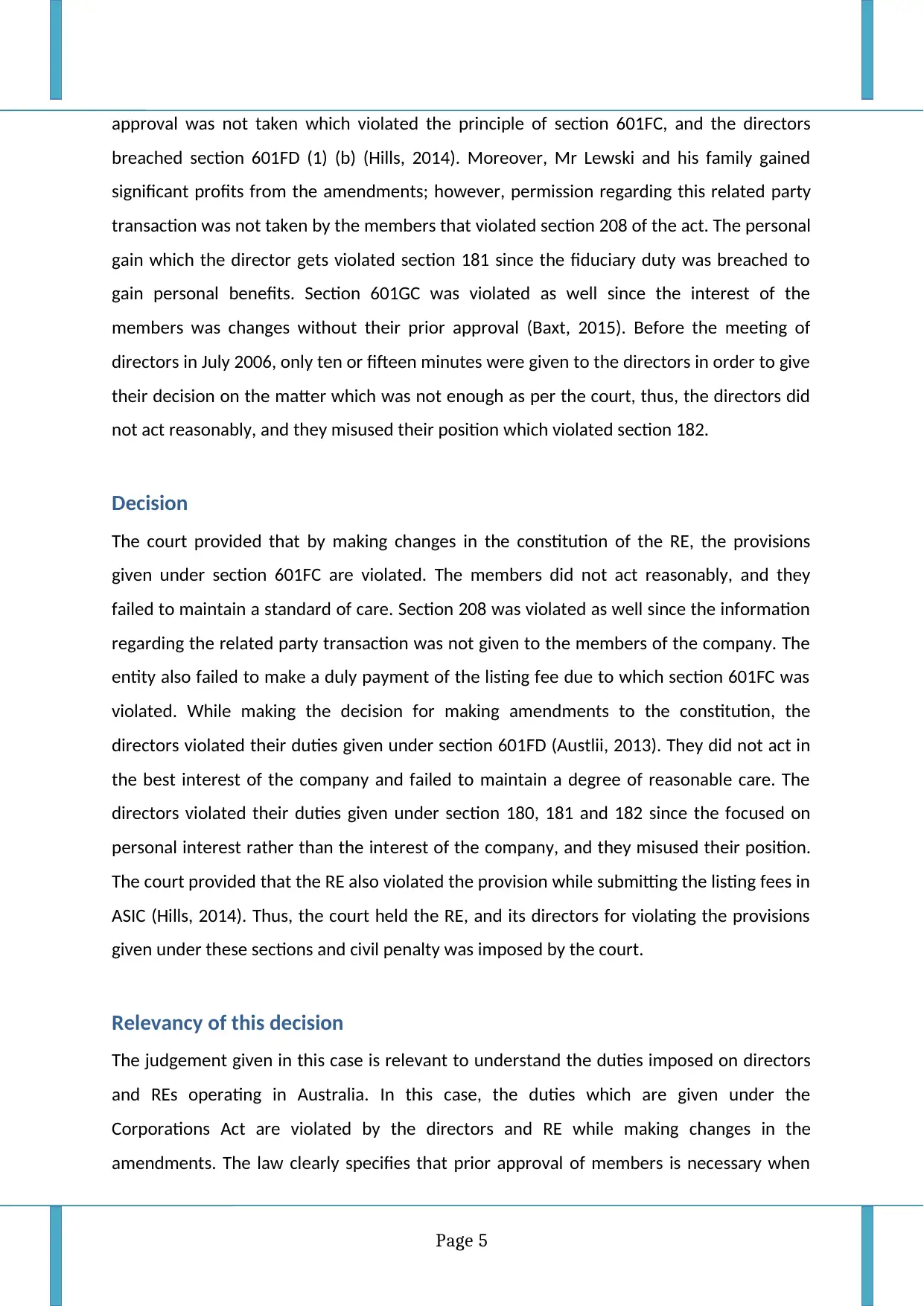
approval was not taken which violated the principle of section 601FC, and the directors
breached section 601FD (1) (b) (Hills, 2014). Moreover, Mr Lewski and his family gained
significant profits from the amendments; however, permission regarding this related party
transaction was not taken by the members that violated section 208 of the act. The personal
gain which the director gets violated section 181 since the fiduciary duty was breached to
gain personal benefits. Section 601GC was violated as well since the interest of the
members was changes without their prior approval (Baxt, 2015). Before the meeting of
directors in July 2006, only ten or fifteen minutes were given to the directors in order to give
their decision on the matter which was not enough as per the court, thus, the directors did
not act reasonably, and they misused their position which violated section 182.
Decision
The court provided that by making changes in the constitution of the RE, the provisions
given under section 601FC are violated. The members did not act reasonably, and they
failed to maintain a standard of care. Section 208 was violated as well since the information
regarding the related party transaction was not given to the members of the company. The
entity also failed to make a duly payment of the listing fee due to which section 601FC was
violated. While making the decision for making amendments to the constitution, the
directors violated their duties given under section 601FD (Austlii, 2013). They did not act in
the best interest of the company and failed to maintain a degree of reasonable care. The
directors violated their duties given under section 180, 181 and 182 since the focused on
personal interest rather than the interest of the company, and they misused their position.
The court provided that the RE also violated the provision while submitting the listing fees in
ASIC (Hills, 2014). Thus, the court held the RE, and its directors for violating the provisions
given under these sections and civil penalty was imposed by the court.
Relevancy of this decision
The judgement given in this case is relevant to understand the duties imposed on directors
and REs operating in Australia. In this case, the duties which are given under the
Corporations Act are violated by the directors and RE while making changes in the
amendments. The law clearly specifies that prior approval of members is necessary when
Page 5
breached section 601FD (1) (b) (Hills, 2014). Moreover, Mr Lewski and his family gained
significant profits from the amendments; however, permission regarding this related party
transaction was not taken by the members that violated section 208 of the act. The personal
gain which the director gets violated section 181 since the fiduciary duty was breached to
gain personal benefits. Section 601GC was violated as well since the interest of the
members was changes without their prior approval (Baxt, 2015). Before the meeting of
directors in July 2006, only ten or fifteen minutes were given to the directors in order to give
their decision on the matter which was not enough as per the court, thus, the directors did
not act reasonably, and they misused their position which violated section 182.
Decision
The court provided that by making changes in the constitution of the RE, the provisions
given under section 601FC are violated. The members did not act reasonably, and they
failed to maintain a standard of care. Section 208 was violated as well since the information
regarding the related party transaction was not given to the members of the company. The
entity also failed to make a duly payment of the listing fee due to which section 601FC was
violated. While making the decision for making amendments to the constitution, the
directors violated their duties given under section 601FD (Austlii, 2013). They did not act in
the best interest of the company and failed to maintain a degree of reasonable care. The
directors violated their duties given under section 180, 181 and 182 since the focused on
personal interest rather than the interest of the company, and they misused their position.
The court provided that the RE also violated the provision while submitting the listing fees in
ASIC (Hills, 2014). Thus, the court held the RE, and its directors for violating the provisions
given under these sections and civil penalty was imposed by the court.
Relevancy of this decision
The judgement given in this case is relevant to understand the duties imposed on directors
and REs operating in Australia. In this case, the duties which are given under the
Corporations Act are violated by the directors and RE while making changes in the
amendments. The law clearly specifies that prior approval of members is necessary when
Page 5
⊘ This is a preview!⊘
Do you want full access?
Subscribe today to unlock all pages.

Trusted by 1+ million students worldwide
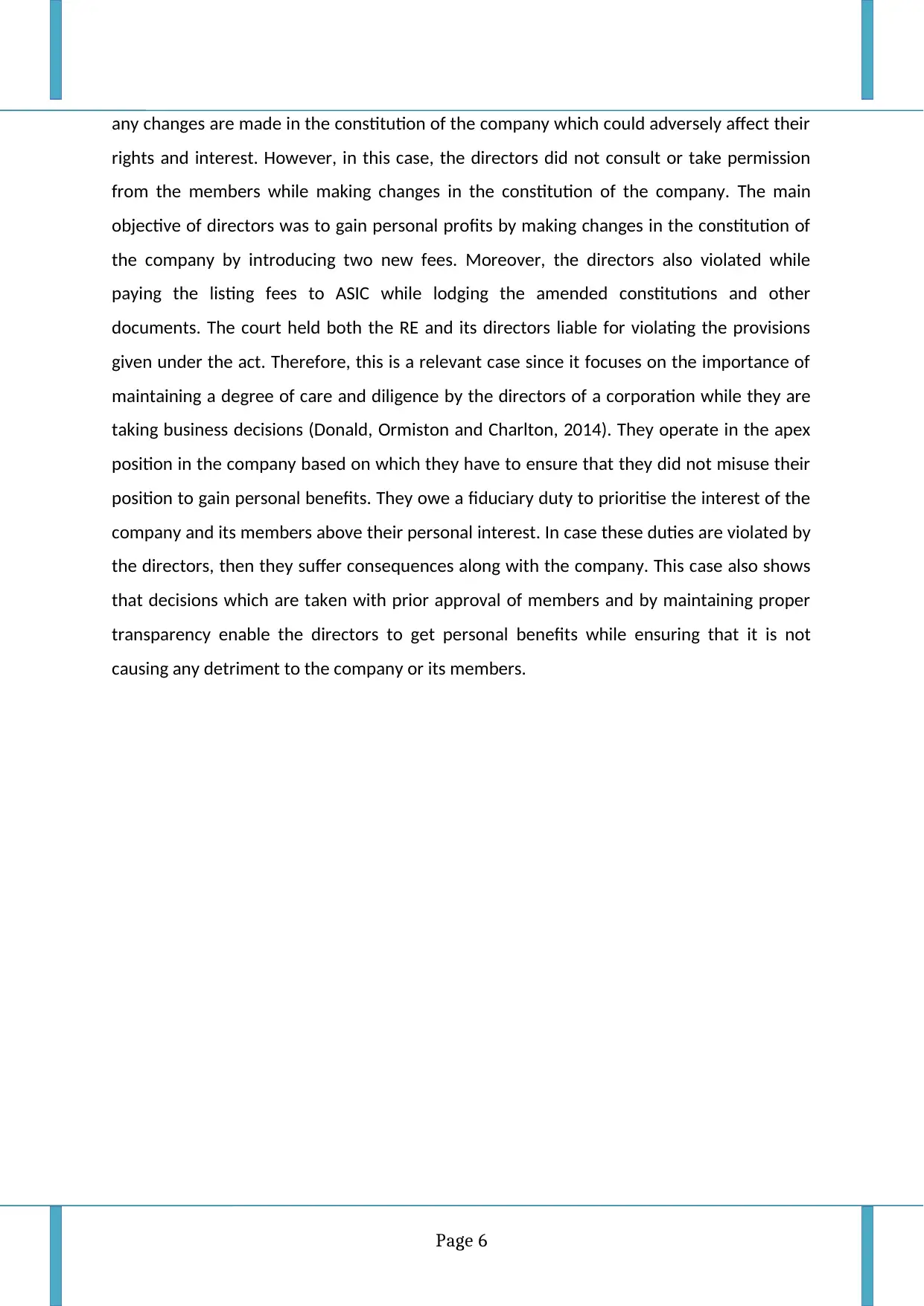
any changes are made in the constitution of the company which could adversely affect their
rights and interest. However, in this case, the directors did not consult or take permission
from the members while making changes in the constitution of the company. The main
objective of directors was to gain personal profits by making changes in the constitution of
the company by introducing two new fees. Moreover, the directors also violated while
paying the listing fees to ASIC while lodging the amended constitutions and other
documents. The court held both the RE and its directors liable for violating the provisions
given under the act. Therefore, this is a relevant case since it focuses on the importance of
maintaining a degree of care and diligence by the directors of a corporation while they are
taking business decisions (Donald, Ormiston and Charlton, 2014). They operate in the apex
position in the company based on which they have to ensure that they did not misuse their
position to gain personal benefits. They owe a fiduciary duty to prioritise the interest of the
company and its members above their personal interest. In case these duties are violated by
the directors, then they suffer consequences along with the company. This case also shows
that decisions which are taken with prior approval of members and by maintaining proper
transparency enable the directors to get personal benefits while ensuring that it is not
causing any detriment to the company or its members.
Page 6
rights and interest. However, in this case, the directors did not consult or take permission
from the members while making changes in the constitution of the company. The main
objective of directors was to gain personal profits by making changes in the constitution of
the company by introducing two new fees. Moreover, the directors also violated while
paying the listing fees to ASIC while lodging the amended constitutions and other
documents. The court held both the RE and its directors liable for violating the provisions
given under the act. Therefore, this is a relevant case since it focuses on the importance of
maintaining a degree of care and diligence by the directors of a corporation while they are
taking business decisions (Donald, Ormiston and Charlton, 2014). They operate in the apex
position in the company based on which they have to ensure that they did not misuse their
position to gain personal benefits. They owe a fiduciary duty to prioritise the interest of the
company and its members above their personal interest. In case these duties are violated by
the directors, then they suffer consequences along with the company. This case also shows
that decisions which are taken with prior approval of members and by maintaining proper
transparency enable the directors to get personal benefits while ensuring that it is not
causing any detriment to the company or its members.
Page 6
Paraphrase This Document
Need a fresh take? Get an instant paraphrase of this document with our AI Paraphraser
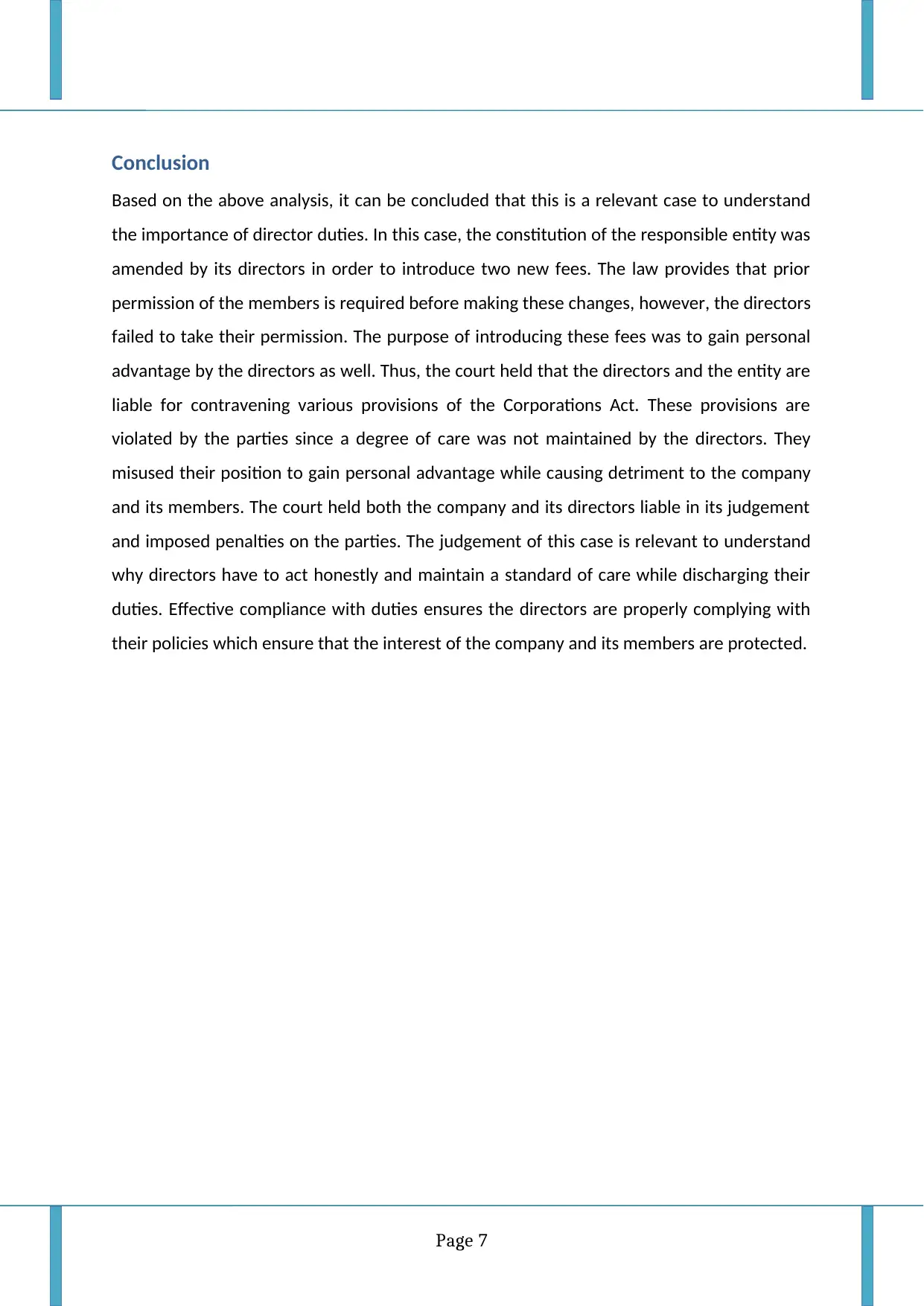
Conclusion
Based on the above analysis, it can be concluded that this is a relevant case to understand
the importance of director duties. In this case, the constitution of the responsible entity was
amended by its directors in order to introduce two new fees. The law provides that prior
permission of the members is required before making these changes, however, the directors
failed to take their permission. The purpose of introducing these fees was to gain personal
advantage by the directors as well. Thus, the court held that the directors and the entity are
liable for contravening various provisions of the Corporations Act. These provisions are
violated by the parties since a degree of care was not maintained by the directors. They
misused their position to gain personal advantage while causing detriment to the company
and its members. The court held both the company and its directors liable in its judgement
and imposed penalties on the parties. The judgement of this case is relevant to understand
why directors have to act honestly and maintain a standard of care while discharging their
duties. Effective compliance with duties ensures the directors are properly complying with
their policies which ensure that the interest of the company and its members are protected.
Page 7
Based on the above analysis, it can be concluded that this is a relevant case to understand
the importance of director duties. In this case, the constitution of the responsible entity was
amended by its directors in order to introduce two new fees. The law provides that prior
permission of the members is required before making these changes, however, the directors
failed to take their permission. The purpose of introducing these fees was to gain personal
advantage by the directors as well. Thus, the court held that the directors and the entity are
liable for contravening various provisions of the Corporations Act. These provisions are
violated by the parties since a degree of care was not maintained by the directors. They
misused their position to gain personal advantage while causing detriment to the company
and its members. The court held both the company and its directors liable in its judgement
and imposed penalties on the parties. The judgement of this case is relevant to understand
why directors have to act honestly and maintain a standard of care while discharging their
duties. Effective compliance with duties ensures the directors are properly complying with
their policies which ensure that the interest of the company and its members are protected.
Page 7
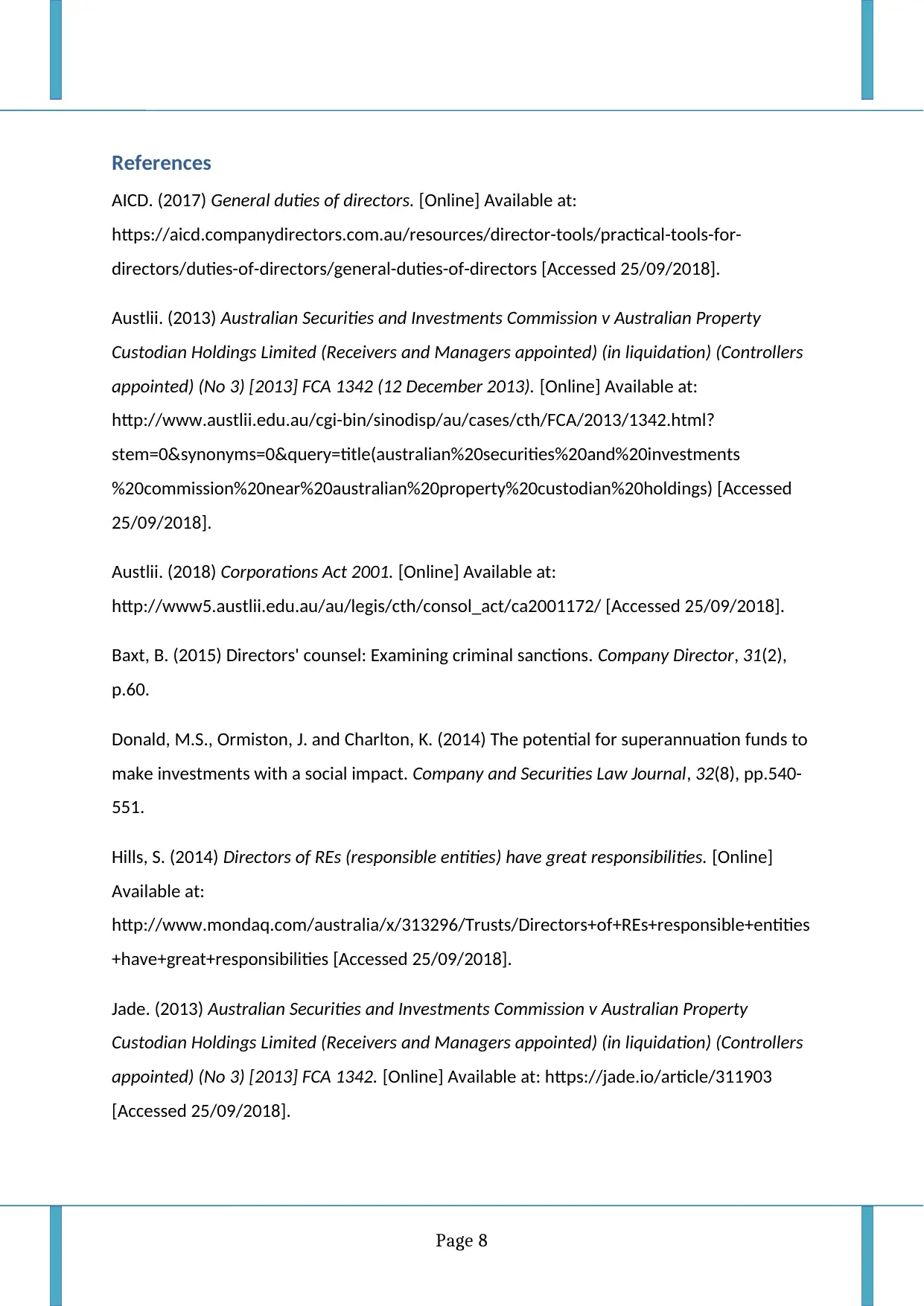
References
AICD. (2017) General duties of directors. [Online] Available at:
https://aicd.companydirectors.com.au/resources/director-tools/practical-tools-for-
directors/duties-of-directors/general-duties-of-directors [Accessed 25/09/2018].
Austlii. (2013) Australian Securities and Investments Commission v Australian Property
Custodian Holdings Limited (Receivers and Managers appointed) (in liquidation) (Controllers
appointed) (No 3) [2013] FCA 1342 (12 December 2013). [Online] Available at:
http://www.austlii.edu.au/cgi-bin/sinodisp/au/cases/cth/FCA/2013/1342.html?
stem=0&synonyms=0&query=title(australian%20securities%20and%20investments
%20commission%20near%20australian%20property%20custodian%20holdings) [Accessed
25/09/2018].
Austlii. (2018) Corporations Act 2001. [Online] Available at:
http://www5.austlii.edu.au/au/legis/cth/consol_act/ca2001172/ [Accessed 25/09/2018].
Baxt, B. (2015) Directors' counsel: Examining criminal sanctions. Company Director, 31(2),
p.60.
Donald, M.S., Ormiston, J. and Charlton, K. (2014) The potential for superannuation funds to
make investments with a social impact. Company and Securities Law Journal, 32(8), pp.540-
551.
Hills, S. (2014) Directors of REs (responsible entities) have great responsibilities. [Online]
Available at:
http://www.mondaq.com/australia/x/313296/Trusts/Directors+of+REs+responsible+entities
+have+great+responsibilities [Accessed 25/09/2018].
Jade. (2013) Australian Securities and Investments Commission v Australian Property
Custodian Holdings Limited (Receivers and Managers appointed) (in liquidation) (Controllers
appointed) (No 3) [2013] FCA 1342. [Online] Available at: https://jade.io/article/311903
[Accessed 25/09/2018].
Page 8
AICD. (2017) General duties of directors. [Online] Available at:
https://aicd.companydirectors.com.au/resources/director-tools/practical-tools-for-
directors/duties-of-directors/general-duties-of-directors [Accessed 25/09/2018].
Austlii. (2013) Australian Securities and Investments Commission v Australian Property
Custodian Holdings Limited (Receivers and Managers appointed) (in liquidation) (Controllers
appointed) (No 3) [2013] FCA 1342 (12 December 2013). [Online] Available at:
http://www.austlii.edu.au/cgi-bin/sinodisp/au/cases/cth/FCA/2013/1342.html?
stem=0&synonyms=0&query=title(australian%20securities%20and%20investments
%20commission%20near%20australian%20property%20custodian%20holdings) [Accessed
25/09/2018].
Austlii. (2018) Corporations Act 2001. [Online] Available at:
http://www5.austlii.edu.au/au/legis/cth/consol_act/ca2001172/ [Accessed 25/09/2018].
Baxt, B. (2015) Directors' counsel: Examining criminal sanctions. Company Director, 31(2),
p.60.
Donald, M.S., Ormiston, J. and Charlton, K. (2014) The potential for superannuation funds to
make investments with a social impact. Company and Securities Law Journal, 32(8), pp.540-
551.
Hills, S. (2014) Directors of REs (responsible entities) have great responsibilities. [Online]
Available at:
http://www.mondaq.com/australia/x/313296/Trusts/Directors+of+REs+responsible+entities
+have+great+responsibilities [Accessed 25/09/2018].
Jade. (2013) Australian Securities and Investments Commission v Australian Property
Custodian Holdings Limited (Receivers and Managers appointed) (in liquidation) (Controllers
appointed) (No 3) [2013] FCA 1342. [Online] Available at: https://jade.io/article/311903
[Accessed 25/09/2018].
Page 8
⊘ This is a preview!⊘
Do you want full access?
Subscribe today to unlock all pages.

Trusted by 1+ million students worldwide
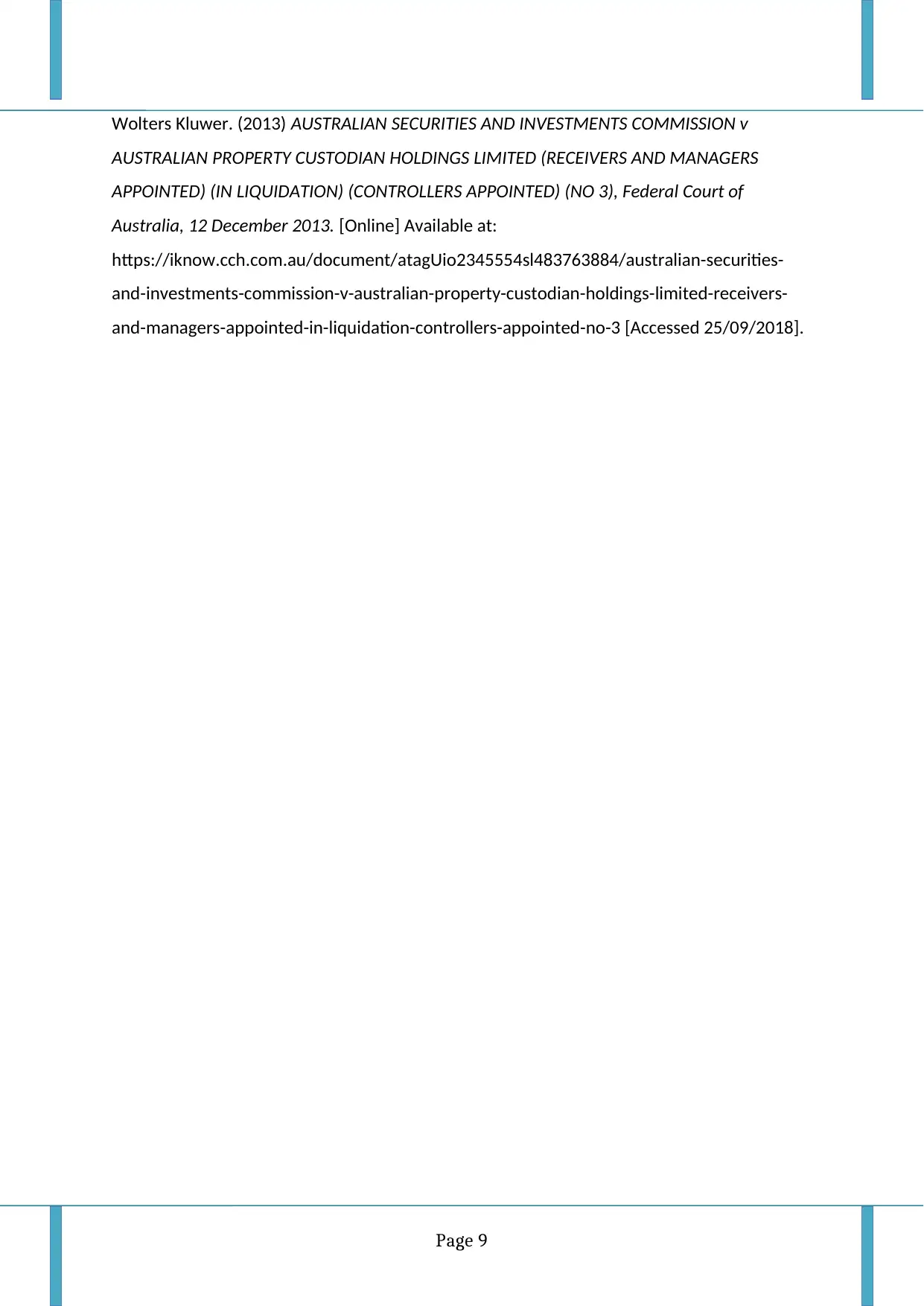
Wolters Kluwer. (2013) AUSTRALIAN SECURITIES AND INVESTMENTS COMMISSION v
AUSTRALIAN PROPERTY CUSTODIAN HOLDINGS LIMITED (RECEIVERS AND MANAGERS
APPOINTED) (IN LIQUIDATION) (CONTROLLERS APPOINTED) (NO 3), Federal Court of
Australia, 12 December 2013. [Online] Available at:
https://iknow.cch.com.au/document/atagUio2345554sl483763884/australian-securities-
and-investments-commission-v-australian-property-custodian-holdings-limited-receivers-
and-managers-appointed-in-liquidation-controllers-appointed-no-3 [Accessed 25/09/2018].
Page 9
AUSTRALIAN PROPERTY CUSTODIAN HOLDINGS LIMITED (RECEIVERS AND MANAGERS
APPOINTED) (IN LIQUIDATION) (CONTROLLERS APPOINTED) (NO 3), Federal Court of
Australia, 12 December 2013. [Online] Available at:
https://iknow.cch.com.au/document/atagUio2345554sl483763884/australian-securities-
and-investments-commission-v-australian-property-custodian-holdings-limited-receivers-
and-managers-appointed-in-liquidation-controllers-appointed-no-3 [Accessed 25/09/2018].
Page 9
1 out of 10
Related Documents
Your All-in-One AI-Powered Toolkit for Academic Success.
+13062052269
info@desklib.com
Available 24*7 on WhatsApp / Email
![[object Object]](/_next/static/media/star-bottom.7253800d.svg)
Unlock your academic potential
Copyright © 2020–2026 A2Z Services. All Rights Reserved. Developed and managed by ZUCOL.





